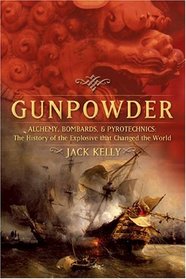I found this an interesting history of the development of gunpowder over the centuries and finally its replacements. One of those replacements was so much better than the original gunpowder even the name "gunpowder" was transferred to that replacement, with the original gunpowder now being called black powder.
Much of what I found interesting in the book was the trivia. For example, as a reader of many of Shakespeare's plays I knew that during his lifetime the Globe Theater in London once burned to the ground, but I never knew why. This book let me know gunpowder was originally used for its entertaining ability, as in fireworks. One play at the Globe theater used gunpowder for this purpose and a spark landed on the thatched roof of the Globe where it caught fire burning the theater down.
With the loud noise of the gunpowder, the smoke and the smell of the burnt powder, Europeans believed it contained devils. A test of 20 lead balls versus 20 silver conical bullets etched with a cross and blessed by priests resulted in 19 hits for the lead balls and no hits for the silver bullets. So armies continued to use the Devil's lead balls. Perhaps this also reveals some interesting facts about the Lone Ranger and his silver bullets. :-)
I've always thought the Parisians attacked the Bastille to free the prisoners at the start of the French Revolution. But it turns out what they really wanted was the gunpowder stored there.
The author also lets us know about the business of making and selling gunpowder over the ages. After all, if you can make a profit by killing people more efficiently, why not? It got so bad at times that governments had to step in, as in the case of the Powder Trust in the late 1800s when the DuPonts had to be reined in by Teddy Roosevelt. Now I know why American soldiers used black powder in the Spanish American War, which created smoke revealing their positions to Spanish soldiers. Whereas the Spanish used the new smokeless powder popular in Europe.
Much of what I found interesting in the book was the trivia. For example, as a reader of many of Shakespeare's plays I knew that during his lifetime the Globe Theater in London once burned to the ground, but I never knew why. This book let me know gunpowder was originally used for its entertaining ability, as in fireworks. One play at the Globe theater used gunpowder for this purpose and a spark landed on the thatched roof of the Globe where it caught fire burning the theater down.
With the loud noise of the gunpowder, the smoke and the smell of the burnt powder, Europeans believed it contained devils. A test of 20 lead balls versus 20 silver conical bullets etched with a cross and blessed by priests resulted in 19 hits for the lead balls and no hits for the silver bullets. So armies continued to use the Devil's lead balls. Perhaps this also reveals some interesting facts about the Lone Ranger and his silver bullets. :-)
I've always thought the Parisians attacked the Bastille to free the prisoners at the start of the French Revolution. But it turns out what they really wanted was the gunpowder stored there.
The author also lets us know about the business of making and selling gunpowder over the ages. After all, if you can make a profit by killing people more efficiently, why not? It got so bad at times that governments had to step in, as in the case of the Powder Trust in the late 1800s when the DuPonts had to be reined in by Teddy Roosevelt. Now I know why American soldiers used black powder in the Spanish American War, which created smoke revealing their positions to Spanish soldiers. Whereas the Spanish used the new smokeless powder popular in Europe.




